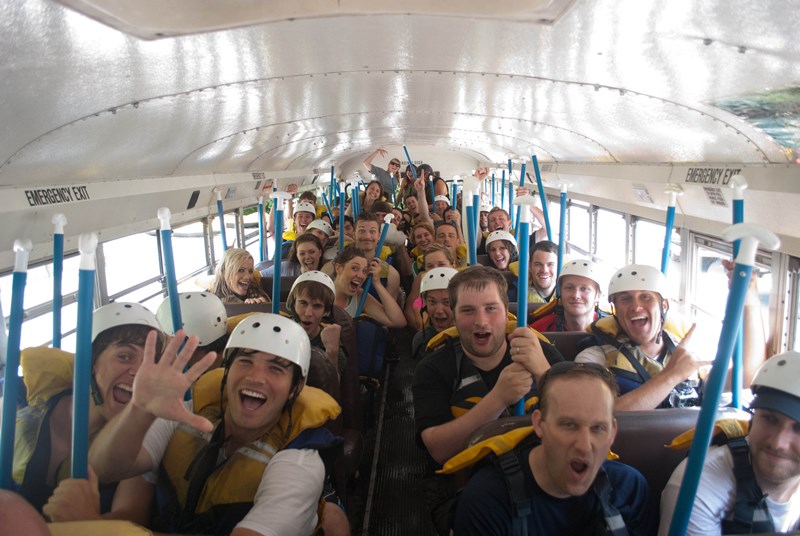By: Trey Barnett, Life in Long Creek
How do you know which marketing levers to pull? Do your customers come from New York City or San Francisco? Do you primarily sell to families or singles? Is your consumer base white collar or blue collar? Are they coming to simply “get outside”? Do they want to build meaningful relationships with their family? How did they hear about us? These are just a few of the questions that we should be asking ourselves as we plan our marketing strategies. When planning how and where to spend your marketing budget, you want to feel confident the investment with pay in the long term. In addition to the analytics tools out there, there is a simple solution closer to home that will help you plan and pivot your marketing efforts.

Your Greatest Asset is your Team
After working in the Outdoor Industry for almost 18 years, I realize that we make One Crucial Mistake (this mistake is not isolate to the Outdoor Industry). We make these decisions in isolation from the front lines. What I mean to say is that we view our frontline staff as one dimensional in our businesses. They are a receptionist; they are a guide; they are a housekeeper; they are a cook, etc. This mentality is stunting the growth of your business. We need to realize that everyone is primarily a salesperson – they might just do it while guiding. If there is one investment to make this Season, it is to empower your team to be your primary marketing force. While this approach has numerous applications, I like to focus on three things at a time – empower them to succeed personally, give them the right questions to ask, and let them tell the organizations story.
How to Gain Employee Loyalty and Trust
Gone are the days of receiving someone’s loyalty simply because you are paying them. Is that a shock to hear? It should not sound that crazy, because people want to give more when they feel cared for. So find out about your employees. This needs to happen at every level of the company. If you are the CEO of a large organization just have a conversation that focuses on them, not the company. Ideally, you want to find ways to contribute to their success. For a guide interested in becoming an accountant, this might mean giving them a short internship with the company’s CPA. For others, it might be sharing the contact of your friend in New York for them to have a place to stay while interviewing for a job. For some, it might be listening to them talk about their passion and asking thoughtful questions. Take your time, care about your employees, this investment will reap fantastic rewards both in business and in their lives.
Give them the tools to contribute
So many of the questions that we want to know about our audience are asked by our staff everyday. The friendly check-in counter lady knows more about the people participating in our activities than just about anyone else, so let’s use that to our advantage. Give them the right questions to ask and a way to easily record the answers. Do you want to know where most of your consumers are from? Do you want to know if you attract families more than singles or corporate groups? Do you want to know who makes the booking decisions? Our guides and frontline staff know. These questions are part of the “getting to know people” process. They can tell you the parts of the experience that people love and the parts they dislike. They can tell you that the second toilet from the right in the men’s bathroom does not flush consistently. They just need to know you want the information and have an easy way to tell you.
One of my favorite methods of data collection is a Google Form. You can identify the questions you want answered and email a link to your staff to fill out. Honestly, if you keep it to 5 simple questions, you can ask them to complete the form everyday as part of their closing duties without it seeming onerous. HERE is a sample form that you can use for your own data collection. Most importantly, only implement this if you are going to use the information gathered and show appreciation for the staff collecting the data. Nothing frustrates a person more than busy-work.
Your Staff Can Help Tell Your Organizational Story
Make sure they know the mission of the company and give them the tools to share it. Even though we get caught up in the busy-ness of life, we are still drawn to stories, so tell the story of your company to your staff over and over again so that it becomes ingrained in their minds. That should know why the company started and what the leaders are passionate about. By focusing on this, it allows them to tell it to the people they encounter on a daily basis and become brand evangelists. Remember, focus on the problem you wanted to solve for others.
Empower Your Staff & Everyone Wins
The reason that your staff do not contribute beyond their job title is often NOT THEIR FAULT! We do not give them the tools to succeed in this endeavor. We do not empower them to succeed personally, give them the questions to ask or let them tell the organizational story, but we can change. We can focus on giving our staff the ability to contribute in a greater way to the success of the organization. They want to be a contributing part to the story. Stop ignoring your greatest asset, your TEAM.
Note From the Author
If you need help developing your story, email me at lifeinlongcreek@gmail.com to outline your company’s mission.